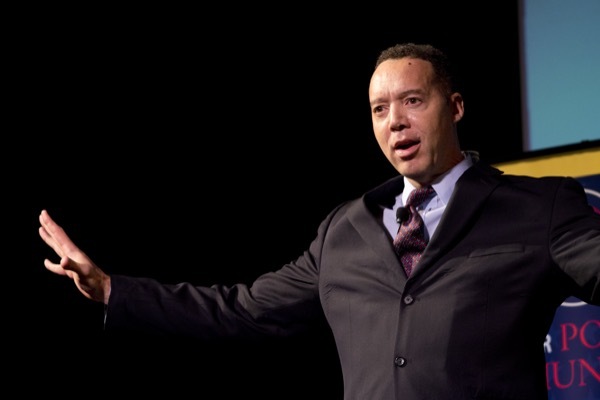Former police officer Redditt Hudson urges criminal justice system reforms : ‘Race in America’
Former police officer Redditt Hudson urges criminal justice system reforms

1:40 p.m., Nov. 19, 2015–Redditt Hudson believes that equal treatment under the law must become a reality if America is going to move forward on matters of race and social justice.
Hudson offered a frank discussion of his views during a University of Delaware National Agenda 2015 “Race in America? speaker series presentation held Wednesday, Nov. 18, in Mitchell Hall.
The author of Suffering in Silence, an investigative report that detailed human rights abuses in St. Louis city jails, Hudson is the co-founder of the National Coalition of Law Enforcement for Justice, Reform and Accountability.
“I”m glad to be here with you tonight to talk about race in America, and, more importantly for me, to talk about police-community relations,” Hudson said. “I”m here to talk to you as candidly as I can.”
A former St. Louis police officer, Hudson said the abuse of authority by some officers has a long and sad history in black communities across the country.
Incidents include the 2012 case of Harold Thomas, an African American detective in the New York Police Department who had been shot a year earlier by a would-be armed robber. Leaving a nightclub, Thomas was not recognized by other police officers and was physically abused and handcuffed.
Hudson also spoke of several incidents he witnessed while on duty, including the physical abuse suffered by a 19-year-old black male who kept trying to tell officers that he couldn’t come out of his house to answer their questions.
After being beaten, handcuffed and dragged by the ankles from his St. Louis row home, the youth was taken to police headquarters and charged with assault on a police officer.
At police headquarters, the officer who initiated the abuse told Hudson that if he ever interfered with her “questioning? of a suspect, she would not ride with him again.
“What always bothers me about that day is that the kid kept saying, “I can’t go,”? Hudson said. “He was on crutches and he was alone in the house.”
Hudson also recalled a 2006 incident when officers stopped a black male in his early 20s at a police checkpoint. The man could not understand what the officers wanted him to do, and he also told them that he had somewhere important to go.
An officer proceeded to beat the young man and used Mace before another officer arrived and saw that the victim received medical attention for the injuries suffered at the hands of the police.
“This simple act of noncompliance can get you killed,” Hudson said. “It turned out that the guy, named Anthony, was on his way to catch a flight back to Iraq for his second tour of duty. He was treated the way police had always treated members of the black community.”
Hudson noted that a long history of such incidents is what led to the calls for equal justice nationwide, including groups such as Black Lives Matter.
“I think it is important for people to hear a different perspective,” Hudson said. “These things happen all the time in the black community. There has been no recognition of the value of black lives in this country.”
Hudson said police officers across the ethnic and racial spectrum have abused their authority, but he also recognized that are many good police officers doing a very difficult job day in and day out.
When it comes to questions about black-on-black crime and why there are no protests related to these incidents, Hudson noted that most crimes are committed in communities by other members who live in the same neighborhoods, regardless of race or ethnic background.
When lives are lost in such incidents, it means that a future has been lost, as well, Hudson said.
“It pains me that our young people are descendants of a community that has been slaughtered and enslaved,” Hudson said. “That pains me.”
While the reality of this history cannot be changed, progress is still possible if people are willing to acknowledge what is happening and work together for effective change, Hudson said.
“First and foremost is accountability. We have to build a movement within the criminal justice system,” Hudson said. “Don’t be afraid of Black Lives Matter – support the movement.”
Hudson also fielded questions from the audience of students, faculty and community members during a question and answer segment moderated by Lindsay Hoffman, associate director of UD’s Center for Political Communication and director of the National Agenda series.
The presentation was the final event in this fall’s National Agenda series, which has included six speakers and four films designed to stimulate conversations about equality and identity.
National Agenda 2015 is supported by the College of Arts and Sciences, the Office of the Provost, the Center for the Study of Diversity and the William P. Frank Foundation of Delaware.
Article by Jerry Rhodes
Photos by Lane McLaughlin
